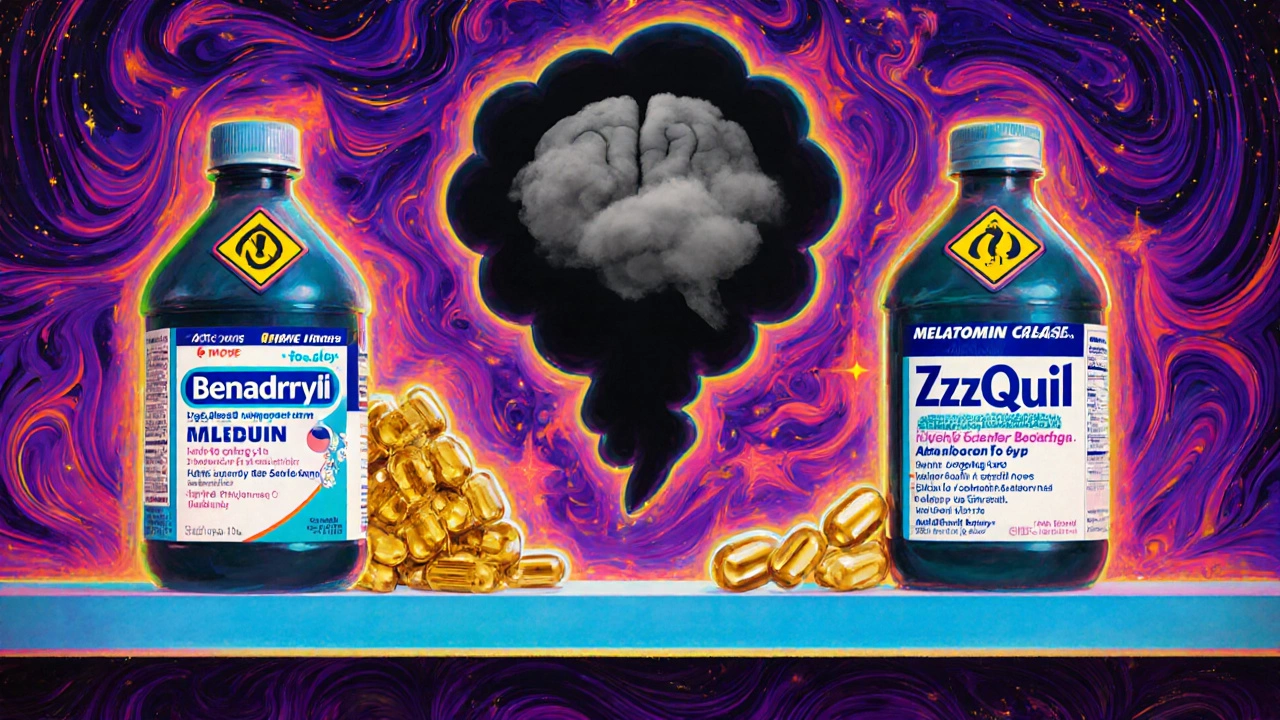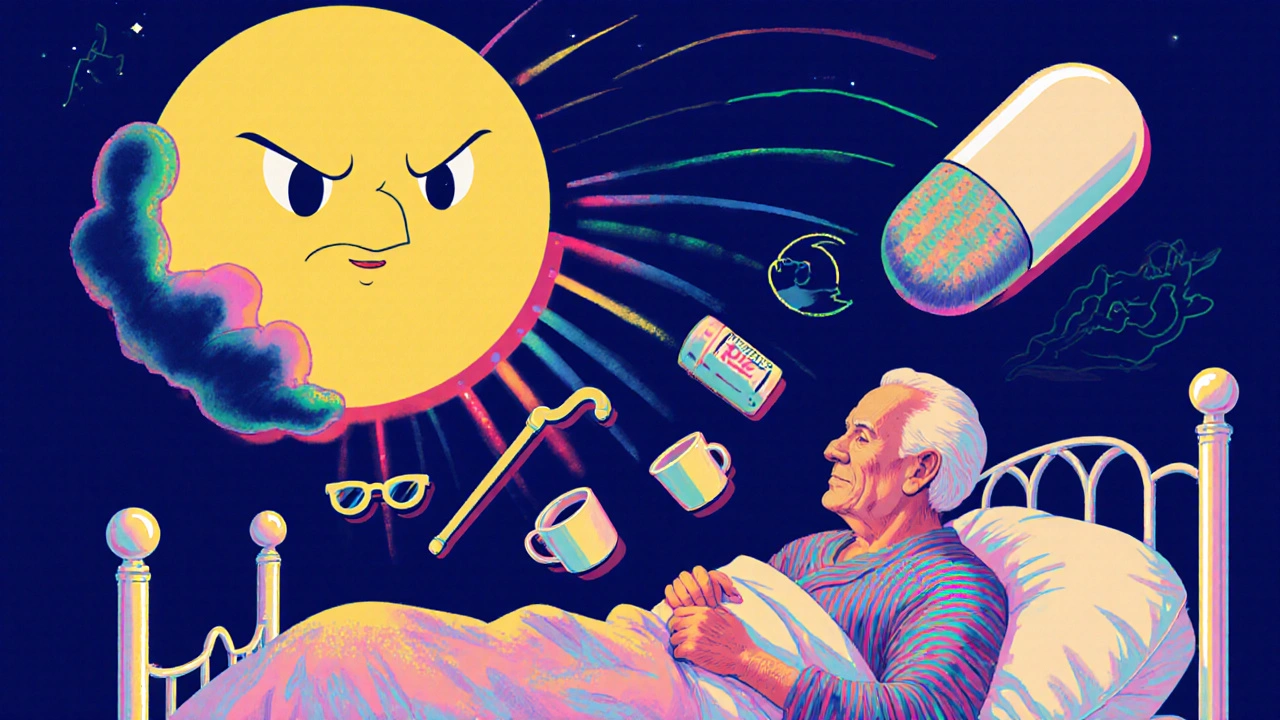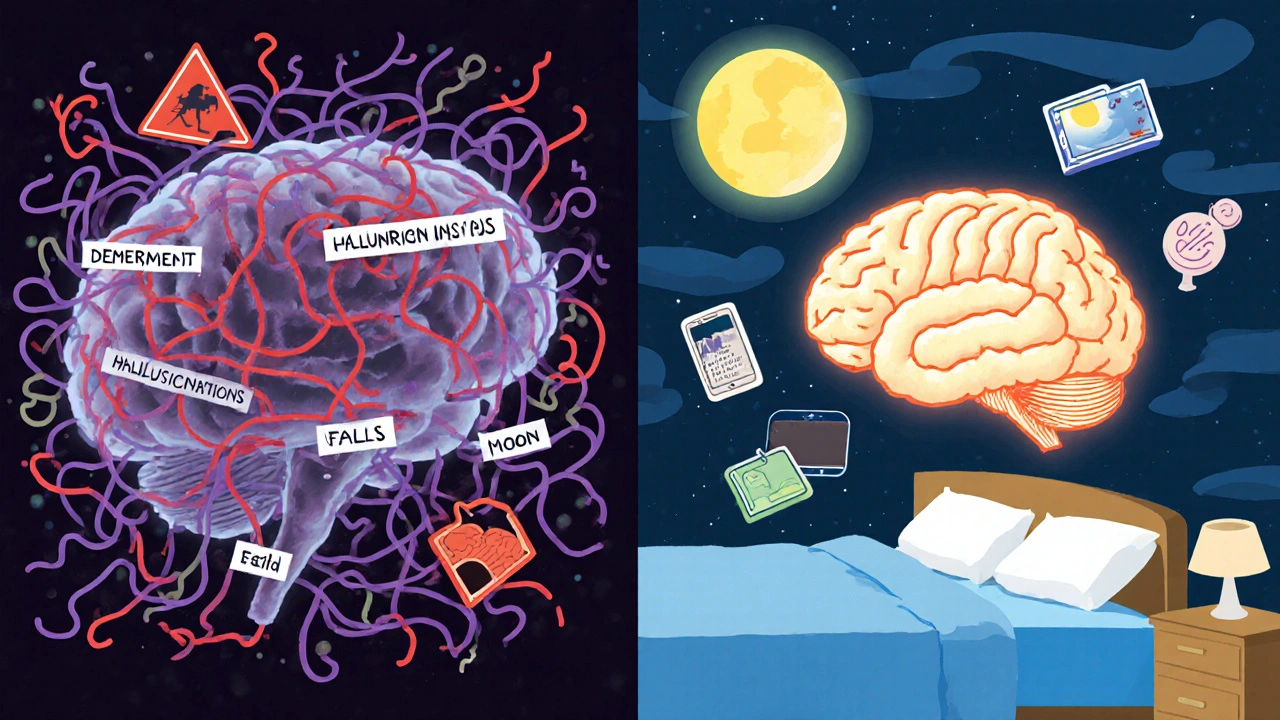Nighttime Sleep Aids with Diphenhydramine: Risks and Safer Alternatives

Diphenhydramine Risk Assessment Tool
Assess Your Risk
Many people reach for diphenhydramine when they can’t fall asleep-brands like Benadryl, Unisom, or ZzzQuil sit on pharmacy shelves like they’re harmless candy. It’s easy to assume that if it’s sold over the counter, it must be safe. But here’s the truth: diphenhydramine isn’t a sleep aid. It’s a sedative with a long list of hidden dangers, especially if you’re over 50 or using it regularly.
How Diphenhydramine Really Works
Diphenhydramine was never designed to help you sleep. It was created in the 1940s as an antihistamine for allergies. Its side effect? Drowsiness. That’s it. The drug blocks histamine in your brain, which naturally keeps you alert. But it doesn’t just stop there. It also blocks acetylcholine-a key chemical for memory, focus, and muscle control. That’s why you feel groggy, dry-mouthed, and foggy the next day.Unlike second-generation antihistamines like cetirizine (Zyrtec) or fexofenadine (Allegra), diphenhydramine crosses the blood-brain barrier easily. A 2023 study found that a 50mg dose of diphenhydramine impaired driving skills as much as a blood alcohol level of 0.10%-above the legal limit in every U.S. state. The FAA bans pilots from using it. Why? Because it doesn’t just make you sleepy. It clouds your thinking.
The Hidden Risks You’re Not Being Told
Most people don’t realize how dangerous diphenhydramine can be long-term. The FDA says it’s safe for occasional use-but what does “occasional” mean? For most users, it means months or years. A 2022 study found 73% of people using it for sleep went past the 14-day limit. And that’s where things get serious.For adults over 65, the risks skyrocket. A 2024 review from Johns Hopkins tracked over 3,000 older adults and found those taking diphenhydramine regularly had a 54% higher risk of developing dementia over seven years. That’s not a small increase. That’s a major red flag. The drug’s anticholinergic effects damage brain pathways linked to memory and learning. It’s not just about feeling foggy in the morning-it’s about long-term brain health.
Other side effects aren’t rare. Dry mouth? Common. Dizziness? Very. But urinary retention? That’s a real problem for men with enlarged prostates. Seizures in children? Documented. Confusion, hallucinations, and falls? All reported in FDA data. One study found 43% of users over 65 had falls or accidents tied to next-day drowsiness. That’s not just inconvenient. That’s life-threatening.
Why It Stops Working (And What Happens When You Keep Taking It)
Diphenhydramine doesn’t help you sleep better. It just knocks you out. And your body gets used to it fast. A University of Michigan study showed 68% of users reported it stopped working after just seven days. So they take more. Or they take it every night. Or they combine it with alcohol. That’s how dependence starts.There’s no true tolerance to sleep itself. Your brain doesn’t learn to sleep better. It just learns to need a chemical to shut down. When you stop, you might feel worse than before-waking up more often, struggling to fall asleep, even experiencing rebound insomnia. That’s why experts say: don’t use it for more than two weeks. But most people do.

Safer Alternatives That Actually Work
You don’t need diphenhydramine to sleep. There are better, safer options.- Melatonin: A natural hormone your body makes to signal sleep. Doses of 2-5mg taken 30-60 minutes before bed help reset your internal clock. A 2023 meta-analysis found it effective for sleep onset in 62% of users-with no next-day grogginess. It’s not a magic pill, but it’s a gentle nudge, not a chemical sledgehammer.
- Cognitive Behavioral Therapy for Insomnia (CBT-I): This isn’t a pill. It’s a proven program that teaches you how to sleep better without drugs. Studies show 70-80% of people improve with CBT-I, and the results last for years. The American Academy of Sleep Medicine calls it the gold standard for chronic insomnia. Many online programs are now covered by insurance.
- Good sleep hygiene: Keep your room cool, dark, and quiet. Avoid screens an hour before bed. Get sunlight in the morning. Don’t nap after 3 p.m. These aren’t just tips-they’re science-backed habits that fix sleep at its root.
Even if you need something stronger, there are prescription options like zolpidem (Ambien) or suvorexant (Belsomra)-but these should only be used short-term under a doctor’s supervision. They’re not perfect, but they’re designed for sleep, not repurposed from allergy meds.
Who Should Avoid Diphenhydramine Completely?
If you’re over 65, you should never take diphenhydramine for sleep. The dementia risk alone makes it too dangerous.Also avoid it if you have:
- Glaucoma (it can trigger acute attacks)
- Enlarged prostate (can cause urinary retention)
- Heart conditions (can speed up your heartbeat)
- Liver or kidney disease (your body can’t clear it properly)
- A history of depression or confusion
And if you’re under 12? Don’t give it to kids. The FDA has warned about hallucinations and agitation in children. That’s not a side effect-it’s a reaction.

The Bigger Picture: Why This Problem Keeps Growing
You might wonder why diphenhydramine is still so popular if it’s so risky. The answer is simple: marketing. It’s cheap, easy to buy, and the packaging says “helps you fall asleep.” No one tells you it’s not designed for that. The OTC sleep aid market is worth nearly $800 million a year. Diphenhydramine still makes up about a third of that. But sales are falling. More people are switching to melatonin, which grew 22% in 2023 alone.Regulators are catching up. The European Medicines Agency now restricts diphenhydramine use in adults over 65. The FDA updated labels in 2023 to warn about hallucinations and confusion. But the warnings are still buried in fine print. You have to know what to look for.
The truth is, you don’t need a chemical to sleep. Your body knows how. You just need to give it the right conditions. And if you’re still struggling, talk to a sleep specialist. Not a pharmacist. Not a Google search. A professional who can help you find the real cause of your sleep problems-whether it’s stress, sleep apnea, or poor habits.
What to Do Today
If you’re currently using diphenhydramine for sleep:- Stop using it every night. Use it only if you absolutely need to, and never for more than 2-3 days in a row.
- Start taking melatonin (2-5mg) 30 minutes before bed. It’s safe, non-habit forming, and doesn’t leave you groggy.
- Try a free CBT-I program online. Many are available through health insurers or apps like Sleepio or CBT-i Coach.
- Write down your sleep habits for a week. Are you scrolling in bed? Drinking coffee after 2 p.m.? Sleeping in on weekends? Small changes make big differences.
- See your doctor if you’ve been struggling for more than a month. Chronic insomnia isn’t normal. It’s treatable.
You don’t have to choose between lying awake and taking a risky pill. There are better ways. And they’re not just safer-they’re more effective in the long run.
Eliza Oakes
November 21, 2025 AT 08:00Oh wow, another ‘pharma is evil’ diatribe. So melatonin is the answer? Cool. I’ve taken it for years and still wake up at 3 a.m. screaming at the ceiling. Maybe your ‘science-backed habits’ don’t work for people who actually have real insomnia, not just bad sleep hygiene. Also, who says ‘diphenhydramine’ like it’s a curse word? It’s just a pill. I’ve been taking it for 15 years and I’m fine. My brain’s not melting. 😏
Clifford Temple
November 22, 2025 AT 17:17This is why America is falling apart. You people treat OTC meds like they’re illegal drugs. Back in my day, we took Benadryl to sleep, worked the next day, and didn’t whine about dementia. Now we need a 12-step program just to fall asleep? Get a job. Stop staring at your phone. Sleep when your body says so. This article is pure woke nonsense.
Corra Hathaway
November 23, 2025 AT 16:16YESSSSS!!! 🙌 I’ve been screaming this from the rooftops for YEARS!! 🤯 Diphenhydramine is NOT sleep, it’s chemical naptime. I switched to melatonin + CBT-I last year and now I’m actually RESTING, not just passed out. My brain feels like it’s been un-fogged. Also, if you’re over 50 and still using ZzzQuil… honey, you’re not sleeping, you’re just waiting for your next brain scan. 💪✨
Shawn Sakura
November 24, 2025 AT 15:41I appreciate this post. Really. It’s well-researched. I used to take Unisom every night for years. Then I started having trouble remembering names. My wife said I was ‘distracted.’ I thought it was stress. Turns out, it was the anticholinergic effects. I switched to melatonin 3mg and CBT-I through my insurance. It took 3 weeks, but now I sleep 7 hours straight. No grogginess. No crashes. Just… sleep. Thank you for sharing this. 🙏
Paula Jane Butterfield
November 25, 2025 AT 17:16Hey everyone, I’m a geriatric nurse in Ohio, and I’ve seen this play out too many times. Grandmas taking Benadryl because ‘it helps me nod off.’ Then they fall in the shower. Or forget to take their heart meds. Or start talking to dead relatives. It’s heartbreaking. Melatonin’s not perfect, but it’s safer. And CBT-I? It’s like physical therapy for your sleep. No pills. No side effects. Just rewiring your brain. You’re not broken. You just need the right tools. I’ve helped 87 patients switch off diphenhydramine. Every single one felt better. You can too. 💙
Simone Wood
November 26, 2025 AT 18:53Let’s be honest: the FDA’s warnings are buried in the same font size as the ‘may cause drowsiness’ disclaimer on cough syrup. Diphenhydramine’s anticholinergic burden is a silent epidemic. The cognitive decline isn’t ‘just aging’-it’s iatrogenic. And the OTC market is a regulatory loophole designed to profit from the elderly’s desperation. The European restrictions are a start. The U.S. needs to ban it for seniors outright. This isn’t ‘personal responsibility’-it’s structural negligence.
Swati Jain
November 28, 2025 AT 00:13LOL. I’m from India and we’ve been using ‘sleeping pills’ from the local chemist for decades. One guy told me to take ‘diphenhydramine’ for stress. I did. Woke up thinking my cat was the Prime Minister. Then I Googled it. Turned out, my aunt had the same problem. Now we all use ashwagandha + sleep meditation. No hallucinations. No fog. Just calm. America, you’re overcomplicating sleep. Sometimes, less is more. 🌿
Florian Moser
November 29, 2025 AT 18:41Great breakdown. I want to add one thing: many people don’t realize that diphenhydramine can interfere with REM sleep, which is critical for emotional regulation and memory consolidation. So even if you ‘fall asleep,’ you’re not getting restorative sleep. That’s why you wake up tired. Melatonin supports natural sleep architecture. CBT-I fixes the root causes. These aren’t ‘alternatives’-they’re upgrades. Stop patching. Start healing.
jim cerqua
November 29, 2025 AT 21:18THIS IS A CULTURAL MASSACRE. 🚨 People are being slowly poisoned by Big Pharma’s OTC scam. Benadryl? It’s a chemical lobotomy disguised as a solution. I used to take 100mg every night. Then I started seeing shadows in the corner of my room. My wife called the ER. They said ‘anticholinergic delirium.’ I was 58. I thought I was having a spiritual experience. Turns out, it was a $10 bottle of poison. I’m now on CBT-I. I sleep like a baby. And I’m not just alive-I’m awake. Don’t let them steal your mind. 🤯
Donald Frantz
December 1, 2025 AT 18:18Is there data on the long-term cognitive effects of melatonin? I’ve seen studies suggesting it may affect circadian rhythms in shift workers. And what about CBT-I accessibility? It’s great in theory, but not everyone has insurance or the time. Also, what’s the dropout rate? Just asking for a friend. The science seems solid, but I want the full picture.
Sammy Williams
December 3, 2025 AT 12:58My dad took diphenhydramine for 10 years. Last year he had a fall and broke his hip. The doctor said it was probably the drowsiness. He switched to melatonin and now he’s hiking again. I know it sounds cheesy, but it’s real. Don’t let pride keep you from trying something safer. You’re worth it.
Debanjan Banerjee
December 4, 2025 AT 19:58India has a similar problem with OTC sedatives-often unlabeled or mixed with benzodiazepines. We call it ‘jugaad sleep.’ But the real solution? Community sleep circles. We’ve started local groups where people share sleep diaries, practice breathing exercises, and turn off phones together. No pills. Just connection. It’s working. Sleep isn’t a product. It’s a practice. Start small. Breathe. Be still.
Michael Marrale
December 5, 2025 AT 16:21They’re lying to you. Diphenhydramine is part of a secret government mind-control program. They want you drowsy so you don’t notice the 5G towers. The FDA knows. The WHO knows. Even your pharmacist knows. But they won’t tell you. That’s why melatonin is banned in 12 countries. They’re scared you’ll wake up and realize the truth. I’ve seen it. My neighbor took it and started talking to aliens. Then he disappeared. 🛸
Corra Hathaway
December 6, 2025 AT 09:29@4445 I feel you. I used to think melatonin was ‘woo-woo’ too. But after 3 weeks of 3mg and no screens after 9, I slept like I was 20 again. No more 3 a.m. panic. No more ‘I’m just tired’ excuses. It’s not magic. It’s biology. And yeah, I still scroll… but now I do it with my eyes open. 😘